
GOLDSMITHS COLLEGE LONDON PAYS HOMAGE TO A PHENOMENAL WOMAN

“I work toward the liberation of women. My books are about survival, just like my own life†(Buchi Emecheta, Nigerian/British Author 1944 - 2017)
On what would have been her 75th birthday, July 21st 2019, the internet’s foremost search engine celebrated Nigerian author, Buchi Emecheta, with a Doodle. This alteration of the Google logo has taken place 4,000 times since the original doodle was produced to commemorate France’s National Day: Bastille Day in the year 2000. The Google Doodle recognises the world’s major holidays and anniversaries and pays homage to the most shining exponents in any field of human endeavour. The Doodle is a marker: Buchi Emecheta is no longer the preserve of her fellow Africans or her fellow Black Britons or of scholars on African literature and African Studies programmes in tertiary institutions or of women – she was a womanist after all. The Doodle is a symbol confirming her status as a global icon of literature and a declaration that her legacy belongs to the whole world.
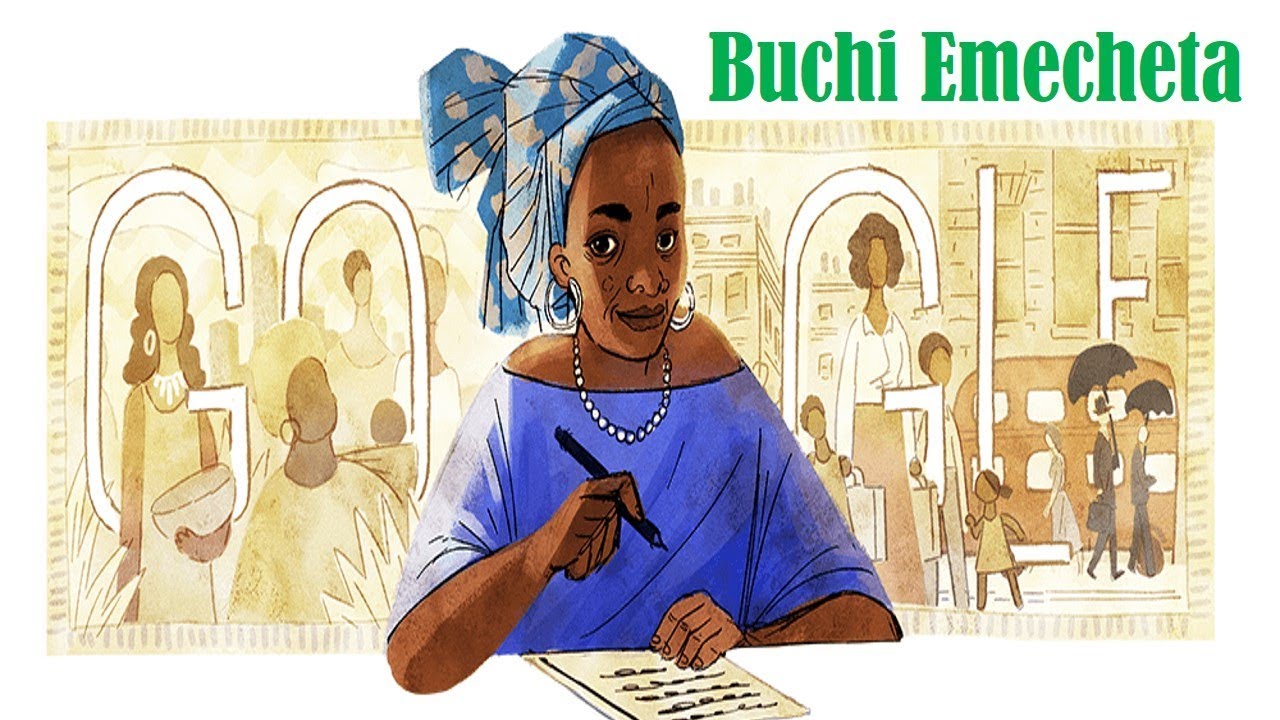
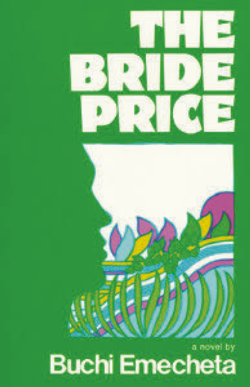
Her
writer’s journey began during a marriage blighted and finally destroyed, by
spousal violence. When Sylvester Onwordi burned the manuscript of her first
novel, The Bride Price, she escaped into the slums of London to battle
poverty, alone. She was 22, pregnant with their 5th child. She was
free, but the picture she cut looked nothing like victory. An Igbo woman in
traditional Yoruba dress, iro and buba
– trudging London streets in1960s, 1970s Britain, harassed by 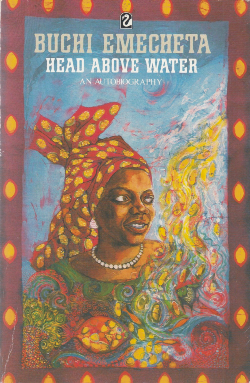 poverty, clutching the hand of one or more of the five
children she bore for Onwordi and who she was raising alone. See her trudging
those cold streets on her way to the British Museum Library where she worked;
on her way to her social work at the Inner London Education Authority. In her
bag what many would have had difficulty believing were her literary works which
would one day bring her international acclaim.What she must have looked like in
those days to those who discovered she was looking fora publisher. Someone to
help get her African woman’s voice heard over the sea of hostile white faces
fearful of the immigrant tidal wave that had landed her on English shores.
poverty, clutching the hand of one or more of the five
children she bore for Onwordi and who she was raising alone. See her trudging
those cold streets on her way to the British Museum Library where she worked;
on her way to her social work at the Inner London Education Authority. In her
bag what many would have had difficulty believing were her literary works which
would one day bring her international acclaim.What she must have looked like in
those days to those who discovered she was looking fora publisher. Someone to
help get her African woman’s voice heard over the sea of hostile white faces
fearful of the immigrant tidal wave that had landed her on English shores.
Emecheta imposed a regimen on herself to write between 4am –6am every morning and produce 2,000 words a day. By the time of her death in 2017, the result of her unflinching regimen was 20 novels and plays for TV, plays for radio, children's books, essays, and her autobiography Head Above Water.
Her novels’ themes were universal, relatable, though she made sure her protagonists behaved and sounded like Africans in a way that evoked for readers (and for herself), the consciousness of the tribal collective which provides the worldview and legislates the behaviour of the traditional African. She was faithful to details and nuance of culture, using local idioms lavishly, relaying graphically the sounds and smells of home. But she exercised restraint with her writer’s freedom. However comical the situations she narrated, she was respectful of her characters, never caricatural.
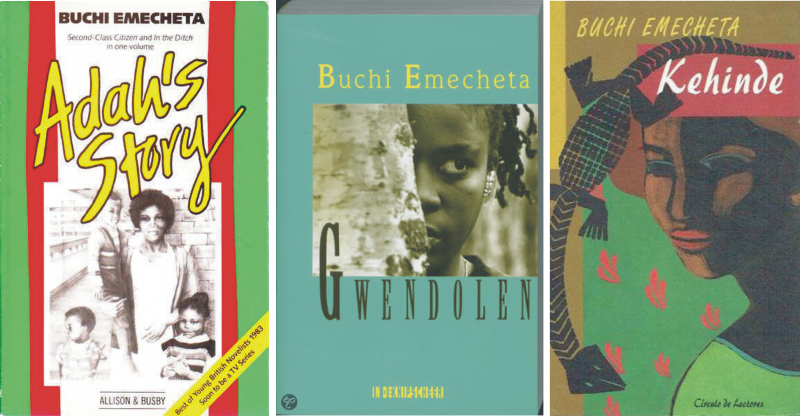
In
a recommendation of any of Buchi Emecheta works, what I would tell a
non-African reader or a reader new to Africa, is to look out for the way her
village born characters are no more at home than the reader is, in the urban
Nigerian settings in which she has placed them. Emecheta brings you up close,
so that you see not only the details of her characters’ struggles but yourself
in Africans confronting problems born of colonialism with its new and difficult
languages, its new and difficult ways of doing virtually everything. See
yourself in Africans confronted by the tensions and conflicts of the human
condition around race, migration, gender, the patriarchy, marriage and
motherhood with its sacrifices, slavery, freedom, oppression, all forms of poverty
and civil war.
Thankfully, Emecheta’s literary success was rewarded in her lifetime: the Jock Campbell New Statesman Award in 1978; a tour circuit as a visiting lecturer of the world's most prestigious universities; she became a fellow of the University of London; won an honorary doctorate in literature from Farleigh Dickinson University; was ranked on major lists featuring prominent literary artists and thought-leaders (BBC History Magazine, Granta) and ultimately, in 2005, she was awarded an OBE, Order of the British Empire, for her services to literature.
My chance to participate in the global celebration of her life and prodigious production, came through an invitation to the launch of the Buchi Emecheta Space holding on Wednesday, 23rd October 2019 at Goldsmiths Library, Goldsmiths College, University of London.

On
the second floor of the Rutherford Building, the Buchi Emecheta Space is
of a modest size. I stopped to admire a black and white portrait photograph of
her in a glass case on the wall. Emecheta is youthful here, dressed up in full aso-oke. Plump, pretty and serene. A yoruba
queen, not a Lagos born Igbo author from the semi-rural town of Ibusa who has
known such suffering and hard-grind. She looks like a beautiful bride who will
fetch a very high price. A calmly assured, hopeful bride.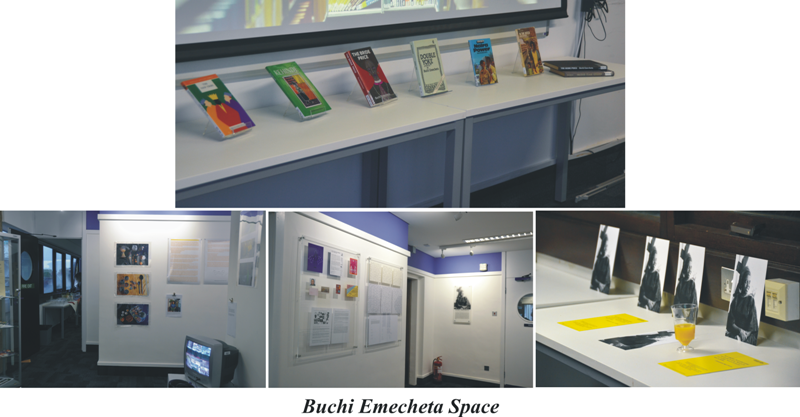
The Space leads to the seminar room where the launch was held. I was welcomed by library staff, Gloria Osojipe into a small crowd of mostly black women, university staff - amongst them postgraduates on the MA Black British Writing Programme - and one man with lilac streaks in his hair. Margaret Busby, the first black female and the youngest publisher in the UK, introduced me to Joy Sigaud, classical musician and black culture activist. Sigaud, an elegant woman, is editor of Editions, the magazine of Black History Month https://editionbhm.comand editor of the Windrush Day Magazine www.windrushday.org.uk Two pioneering black women of letters in Goldsmiths Library to celebrate the woman esteemed to be the first successful black woman novelist in the United Kingdom.
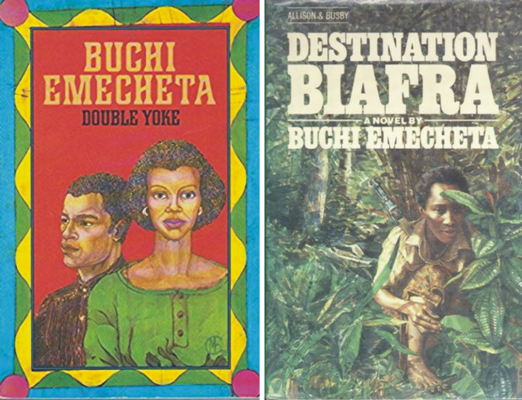
The Bride Price, 1976; Double Yoke, 1982; Naira Power, 1982; In the Ditch, 1972; Second Class Citizen, 1974; The Slave Girl, 1977. Riches Emecheta has poured into the vast treasury of black patrimony and global culture, were on display on shelves ranged along the walls.
Dr. Althea Greenan heads The Women’s Art Library (Special Collections and Archives) at Goldsmiths. She photographed the event held in Emecheta’s memory and generously shared the images with me to support my coverage. She explained that the Space was the brainchild of Jessa Mockridge, artist and member of staff of the Library whose, “love for Buchi Emecheta’s work prompted her to create an exhibition in 2018 in collaboration with Halima Haruna at Goldsmiths working with Buchi Emecheta’s archives.â€
They gave the exhibition a poignant and evocative title: Comeback, mother: Buchi Emecheta, April 2018. It reflects the story told by the author about the reason for her Igbo name, Nnenna:
“My father told me very, very early in my life that why my third Ibo name is Nnenna – father’s mother, was because I am his come back, mother. It was said that when my father’s mother was dying, she had promised that she would come again, this time as his daughterâ€
Come back, mother showcased, ‘fragments found, lifted, reproduced and re-read from Buchi Emecheta’s personal archive, including: books, manuscripts, plays, letters, notebooks, ephemera, essays, newspapers and unpublished material’.
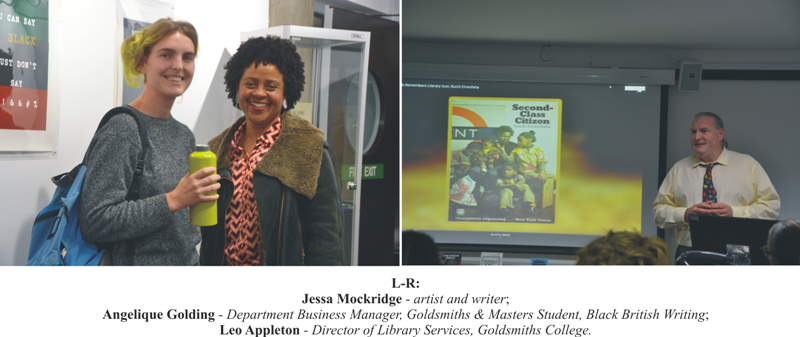
Now,
on 23rd October 2019, Leo Appleton, Director of Library Services at
Goldsmiths, delivered a Welcome Address which focused on the objectives of the Buchi
Emecheta Space. He explained that the current exhibition:
Becoming An Archive, featuring the work of Rebecca Bellantoni presented
by the collective, Present Futures, advanced
a key objective: it envisaged students and staff using the Space to reflect on
collections in the Goldsmiths Library and on collections and works outside
Goldsmith archives. Further, the space seeks to highlight works of women and
non-binary artists of colour from 1992 onwards and in particular seeks to
attract students in the college whose academic disciplines would not normally
accommodate self-expression through exhibitions. Appleton spoke of the power of
Buchi Emecheta’s work to address critical issues including feminism and
post-colonialism and its capacity to enrich students’ understanding of the
world.
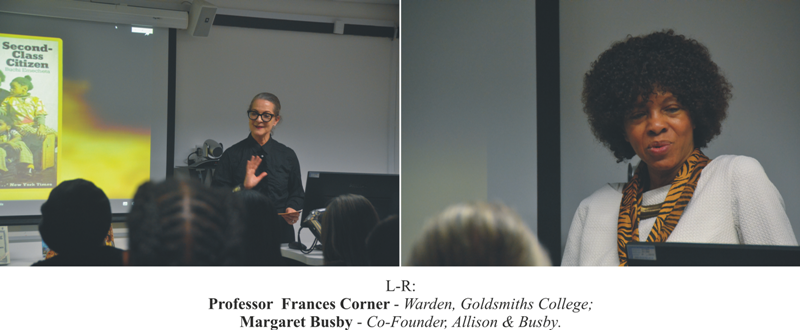
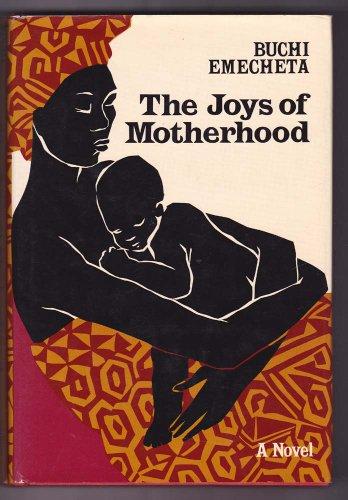
The Warden of Goldsmiths College, Professor Frances Corner, described the launch as “really importantâ€. She remarked - with justifiable pride - that Goldsmiths College produced trailblazers such as 2019 Booker Prize winner, Bernardine Evaristo (Nigeria/UK) and added that Buchi Emecheta, champion of literature, orature and music, decolonising before many understood what that term meant, was the “original trailblazerâ€.
A Department Business Manager at Goldsmiths, Angelique Golding is also pursuing an MA in Black British Writing at the College. She told us about the accessibility of the writing she found in Second Class Citizen, which was her introduction, like many others, to the worlds populated by characters Emecheta paints so viscerally with bold brush strokes. But Golding read from The Joys of Motherhood, the novel which introduced me to the matriarch of Nigerian literature; a literature which is turning out to be far more exportable than many – including Africans - have been led to expect. She read with palpable enjoyment, bringing to life the noisy negotiations taking place within the hierarchy of the fictional polygamous marriage eked out in dire poverty in colonial Lagos. Domestic violence, wives as beasts of burden, polygamy’s anguish and farcical moments.In The Joys of Motherhood, there are many. I paraphrase Golding’s quote from the book:
‘These rebellious women chasing and beating their husband. This noise could be heard by the neighbours!’
It was Margaret Busby’s turn to speak. Co-founder of Allison & Busby and Emecheta’s first UK publisher, she spoke about the author’s background in Lagos, her ill-fated marriage to Sylvester Onwordi and about her articles in the New Statesman which were feisty and outspoken about gender, class and race. On meeting the Nigerian author and reading her manuscripts, Busby told the room she had no choice: “I had to publish her! Both of us black women in our twenties; the two of us making our non-conformist way in a conventional literary worldâ€. And later, in conversation, “Two West African women all over London, nobody understood what we were doing!â€
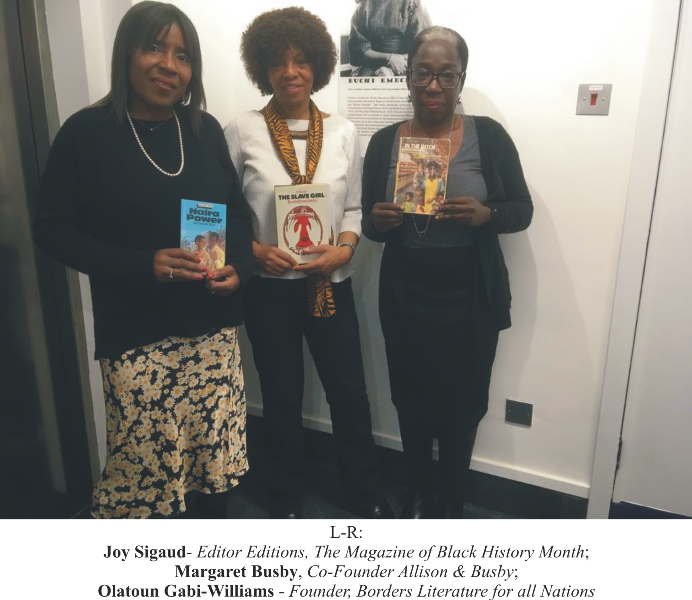
Busby’s narration of Emecheta’s biography was moving: fatherless (by the Burma Campaign of World War II) at just 9; betrothed at 11, married at 16. And after what must have felt like everlasting grind, rewarded. Her struggle to raise five children single-handedly, to get and keep paid employment,at unearthly hours of the morning,to write her stoic heart out,all this would bear delicious fruit: a set of timeless early novels published by Allison & Busby followed by more novels, children’s books, radio plays, TV plays and essays. An epic life. It would be a great thing to watch Buchi Emecheta write her way against incredible odds to international acclaim on the big screen.
Emecheta's editor, Margaret Busby, held up the Allison & Busby edition of The Slave Girl. It was a touching moment. Dedicated to, “M. Busby for believing in meâ€, the novel went on to win the Jock Campbell New Statesman Award in 1978, a year after publication.
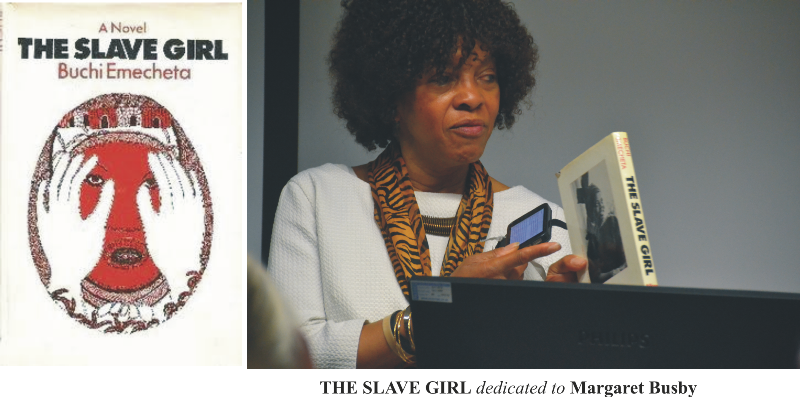
“Dogged pursuit...realisation of a seemingly impossible dreamâ€. These were Busby’s words to describe Buchi Emecheta’s legendary journey. A stroke in 2010 cruelly incapacitated her but despite her condition, Busby assured the audience that the eyes and smile of this Lagos born Igbo writer, teacher, library worker, womanist and mother,“still possessed the indomitable spirit which inspires Adichie, Evaristo and (will inspire) many generations to comeâ€
Buchi Emecheta died from stroke-related complications on 25th January 2017. She was 72.

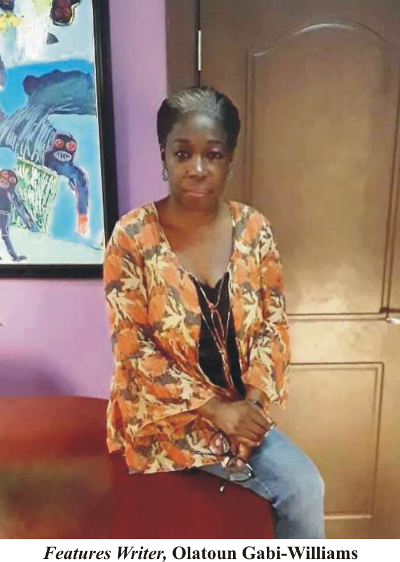


I am drawn to people of mixed-cultural descent and of mixed-race heritage. I'm also drawn to ...
David Aguilar, born in Andorra, is an inspiring figure known for his resilience and crea ...